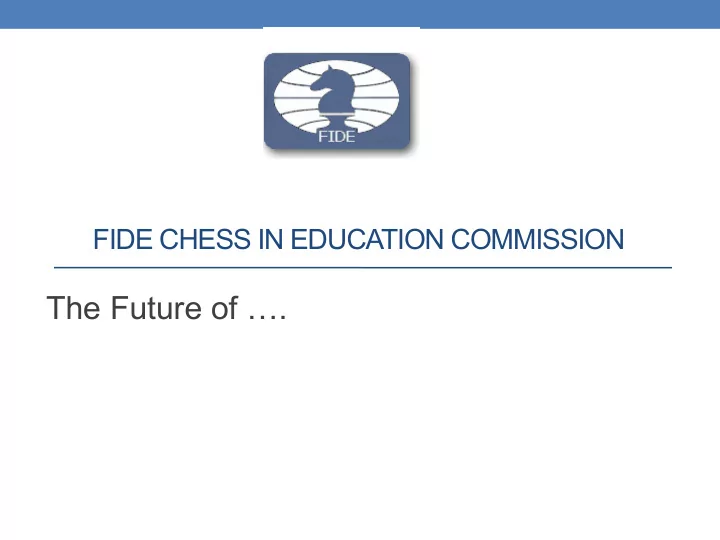

FIDE CHESS IN EDUCATION COMMISSION The Future of ….
From the FIDE Handbook: 2.4 Chess in Schools Commission (CiS) renamed: Chess in Education Commission (EDU) • 2.4.1 The SCH shall assist National Federations to introduce Chess in schools. • 2.4.2 The SCH shall prepare curricula and courseware for chess education in schools. • 2.4.3 The SCH shall prepare training programs for schools. • 2.4.4 The SCH shall make recommendations and propose amendments, as it sees fit, in its field of competence. WHATEVER
The Mission: • Chess for Education (CFE) not Education for Chess (EFC). • Using chess within the educational framework to improve educational outcomes rather than using the educational environment to produce chess players (although that is an inevitable and very welcome by-product). • The main focus of CiS is a social educational programme in primary and secondary schools, with particular emphasis on the ages 7-11. • ‘CiS’ will this year provide a social educational programme for pre-schoolers at home or in kindergarten : maybe… • ‘CiS’ is also important at third level, in further education, especially aiming to encourage research and to develop the professionalization of chess teaching.
My Proposal: Initiate Motivate (Agitate! ) Propagate – Officiate – Curate & Translate
Initiate - Motivate (Agitate!): Every country is different! And has different needs • Encourage federations and continental federations to develop chess in schools or support others doing so. • Some countries have no CIS programmes, some are advanced. In some countries chess is recognised as a sport, in others it is not. • In some countries chess is recognised within the education system and in some it is not. • As the governing body FIDE should be working with federations and help in developing relationships at government level and even in assisting with campaigns where needed by providing PR and campaign ideas as well as supporting material
Propagate: EDU should act as the hub to send the chess in education message • The message needs to go out in multi-language, not just to federations but also education ministries – education think tanks and consultants, trade unions, local governments and regional governments about how chess as a low-cost educational intervention can produce better educational outcomes. • The success stories and positive research too often does not get a wide enough audience with just the occasional chess and education conference where ideas are exchanged between a small group of people in the ‘industry’. • Support chess and education seminars aimed at more broader audiences • EDU should also make sure they are at the leading global education conferences making the case for chess in education
Officiate: EDU should regulate standards and sanction chess teacher training courses for different levels of proficiency and for different kinds of interventions. • EDU should also approve, but not produce! chess courses for children, translate the best ones and continue it’s sanctioning of FIDE trainers. • Maybe create a new title: FIDE Schools Trainer as current titles are orientated to teaching mainstream chess and developing stronger players. • There is potential for a massive global schools tournament online but not on the FIDE playing zone!
Curate: EDU should be the hub that collects and shares best practice in chess teaching and chess teacher training and be the repository for chess and education research • Compile teaching material, classify and make widely available to the schools chess community and to the education profession generally • Act as the portal for all chess and education research and ensure the chess community is aware of all new research and developments • Disseminate the huge amount of training materials that already exist , the best from all countries and host seminars for experts to share their ideas
Translate:
THANK YOU Malcolm Pein Chief Executive
Recommend
More recommend